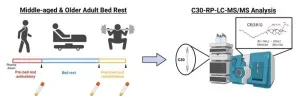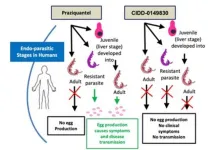(Press-News.org)
Hundreds of studies are published each year on attention deficit hyperactivity disorder (ADHD), but more work is needed to ensure those findings improve lives.
With input from expert stakeholders across the field, researchers at the Southern California Evidence Review Center, part of the Keck School of Medicine of USC, have synthesized the latest insights so that they can ultimately inform clinical practice. Broadly, they found that both medications and psychosocial treatments work for treating ADHD and that children with the condition can and do get better.
“We have more research than ever on ADHD, but we need to summarize it in a reliable and valid way,” said Susanne Hempel, PhD, a professor of clinical population and public health sciences at the Keck School of Medicine and director of the Southern California Evidence Review Center, who oversaw the work.
The team, which included researchers from the Southern California Evidence-based Practice Center, the Keck School of Medicine’s division of child psychiatry and the Children’s Hospital Los Angeles Behavioral Health Institute, reviewed more than 23,000 publications on ADHD. Their work was commissioned by the Agency for Healthcare Research and Quality and funded by the Patient-Centered Outcomes Research Institute.
The results, just published in two companion papers in the journal Pediatrics, answer big questions about what works to effectively diagnose and treat ADHD, and point to ongoing gaps in the research, including how best to monitor the condition’s progression over time. Clinicians selected by the American Academy of Pediatrics (AAP) will now use the evidence review to create updated clinical guidelines that inform best practices in ADHD care across the nation.
“Parents, teachers and providers need evidence-based information about ADHD,” Hempel said. “We included only the most robust studies in our review, which enables us to make strong evidence statements.”
New findings on diagnosis and treatment
Before beginning the literature review, the research team developed their questions and protocols in collaboration with ADHD experts across the field to ensure they were asking and answering questions that could directly benefit patients, families and providers. During the process, the researchers also posted their preliminary findings and welcomed feedback during a 45-day public comment period.
The team conducted an extensive search that was not restricted to diagnostic tools or treatment approaches already known to be effective. From more than 23,000 publications, the researchers selected 550 studies for the final analysis. Studies were selected if they met the team’s rigorous inclusion criteria, which prioritized rigorous study designs such as randomized controlled trials.
For diagnosis of ADHD, many tools are available, including parent and teacher rating scales, patient self-reports, neuropsychological tests, EEG approaches, imaging, biomarkers, activity monitoring and observation. For several approaches, the researchers found a substantial variation in results, with some studies indicating a given method was highly effective and others indicating that it performed poorly. “We’re getting better at diagnosing ADHD, but research is still characterized by a lot of variation,” Hempel said.
Many treatments for ADHD have been rigorously tested, building a strong evidence base for medications (including both stimulants and non-stimulants), as well as psychosocial approaches, such as behavior modification. Other non-drug treatments the team analyzed include cognitive training, neurofeedback, physical exercise, nutrition and supplements, parent support, and school interventions.
“Medications have the strongest evidence for improving not only ADHD symptoms, but also other problems that often accompany ADHD, such as oppositional and disruptive behaviors,” said Bradley Peterson, MD, director of the Institute for the Developing Mind at Children's Hospital Los Angeles (CHLA) and the lead author of the review.
Monitoring ADHD over time
In addition to reviewing the evidence on diagnosis and treatment, the researchers explored what is known about ongoing monitoring of ADHD: How can providers assess whether a child or adolescent needs to continue treatment for the condition? Experts across the field agreed that the question is a critical one, but few studies have explored the question. The evidence review team concluded that more research is needed on monitoring ADHD over time.
The publications will now be used to support an update of the AAP’s clinical practice guidelines for ADHD, providing up-to-date advice for how best to diagnose, evaluate and treat the condition.
“The overarching takeaway: ADHD is treatable. There are lots of studies that can show us that children absolutely can get better,” Hempel said.
About this research
In addition to Drs. Peterson and Hempel, the study’s other authors are Joey Trampush, Morah Brown, Margaret Maglione, Maria Bolshakova, Mary Rozelle, Jeremy Miles, Sheila Pakdaman and Aneesa Motala among others from the Southern California Evidence Review Center, Keck School of Medicine, University of Southern California.
This work is supported by the Agency for Healthcare Research and Quality [Contract No. 75Q80120D00009] and the Patient-Centered Outcomes Research Institute [Publication No. 2023-SR-03]. More information about AHRQ’s Effective Health Care program, which funds this work, may be found at: https://effectivehealthcare.ahrq.gov/about.
END
Researchers at the University of Waterloo's Institute for Quantum Computing (IQC) have brought together two Nobel prize-winning research concepts to advance the field of quantum communication.
Scientists can now efficiently produce nearly perfect entangled photon pairs from quantum dot sources.
Entangled photons are particles of light that remain connected, even across large distances, and the 2022 Nobel Prize in Physics recognized experiments on this topic. Combining entanglement with quantum dots, a technology recognized with the Nobel Prize in Chemistry in 2023, the IQC research team aimed to optimize the ...
By exploring attitudes in the USA, UK, Italy, South Africa, Mexico, and Poland – countries with different economies, cultures and political regimes (past and present) – the paper shows that, in all countries, right- compared to left-wing supporters evaluated the past more positively.
The data reveal that, in part, this occurs because right-wing supporters are more nostalgic about tradition. While the right looked more favourably to the past, in the USA and Poland (and potentially in the UK too), the left was more ...
Scientists have successfully carried out pioneering fecal microbiota transplantations on Navy bottlenose dolphins that showed signs of gastrointestinal disease.
One dolphin in particular who was outwardly ill was able to be taken off medication during the treatment course, with his appetite and energy returning to normal, according to the team at the National Marine Mammal Foundation.
The project was carried out jointly between the NMMF, the U.S. Navy Marine Mammal Program and the Gilbert Lab at UCSD School of Medicine and Scripps Institution of Oceanography, and its findings were published in the Journal of ...
Scientists report they have extracted a compound with powerful antibacterial properties from the skin of farmed African catfish. Although additional testing is necessary to prove the compound is safe and effective for use as future antibiotic, the researchers say it could one day represent a potent new tool against antimicrobial-resistant bacteria such as extended-spectrum beta-lactamase (ESBL) producing E. coli.
Hedmon Okella is a postdoctoral researcher at the University of California, Davis, and led the project.
“The global public health threat due to antimicrobial resistance ...
A new study examining cholesteryl esters suggests that periods of prolonged inactivity may affect people differently depending on their age. Cholesteryl esters — which consist of cholesterol molecules bonded with fatty acids — store and transport cholesterol throughout the body.
As people get older, their risk of being hospitalized or bedridden increases. These long periods of inactivity come with a host of negative health effects such as reduced insulin function and loss of lean muscle, bone mass and strength. Scientists are working to better understand the biology involved in these changes so that ...
A newly developed compound is showing promise in animal studies as a more effective treatment for human schistosomiasis, an understudied tropical disease caused by parasitic worms. The spread of schistosomiasis, a disease responsible for nearly 12,000 deaths globally each year, has been documented in 78 nations.
Although schistosomiasis transmission tends to occur in tropical and subtropical areas, climate change could shift it into new areas such as southern Europe. There is currently no vaccine available for the disease, which comes with severe clinical symptoms. The drug praziquantel is used for treatment. However, resistant mutations ...
New research conducted in mice offers insights into what’s going on at the molecular level that could cause people with diabetes to develop Alzheimer’s disease.
The study adds to a growing body of research on the links between Type 2 diabetes and Alzheimer’s disease, which some scientists have called “Type 3 diabetes.” The findings suggest that it should be possible to reduce the risk of Alzheimer’s by keeping diabetes well controlled or avoiding it in the first place, according to researchers.
Narendra Kumar, an associate professor at Texas A&M University in College ...
A new way to classify tuberculosis (TB) that aims to improve focus on the early stages of the disease has been presented by an international team involving researchers at UCL.
The new framework, published in The Lancet Respiratory Medicine, seeks to replace the approach of the last half century of defining TB as either active (i.e., causing illness and potentially infectious to others) or latent (being infected with the bacterium that causes TB [M tuberculosis] but feeling well and not infectious to others) – an approach researchers say is limiting progress in eradicating the disease.
Of ...
**Note: the release below is a special early release from the European Congress of Clinical Microbiology and Infectious Diseases (ECCMID 2024, Barcelona, Spain, 27-30 April). Please credit the congress if you use this story**
A study of two large European patient cohorts has found that for every 10% increase in butyrate-producing bacteria in a patient’s gut, the risk of hospitalisation for any infection falls by between 14 and 25% across two large national cohorts. The study will be presented at this year’s European Congress of Clinical Microbiology and Infectious Diseases (ECCMID 2024) in Barcelona, Spain (27-30 April) and is by ...
Research led by Macquarie University sheds new light on how concentrations of metals used in renewable energy technologies can be transported from deep within the Earth's interior mantle by low temperature, carbon-rich melts.
The findings published this week in the journal Science Advances may assist global efforts to find these valuable raw materials.
An international team led by Dr Isra Ezad, a postdoctoral research fellow from Macquarie University’s School of Natural Sciences, carried out high pressure ...



